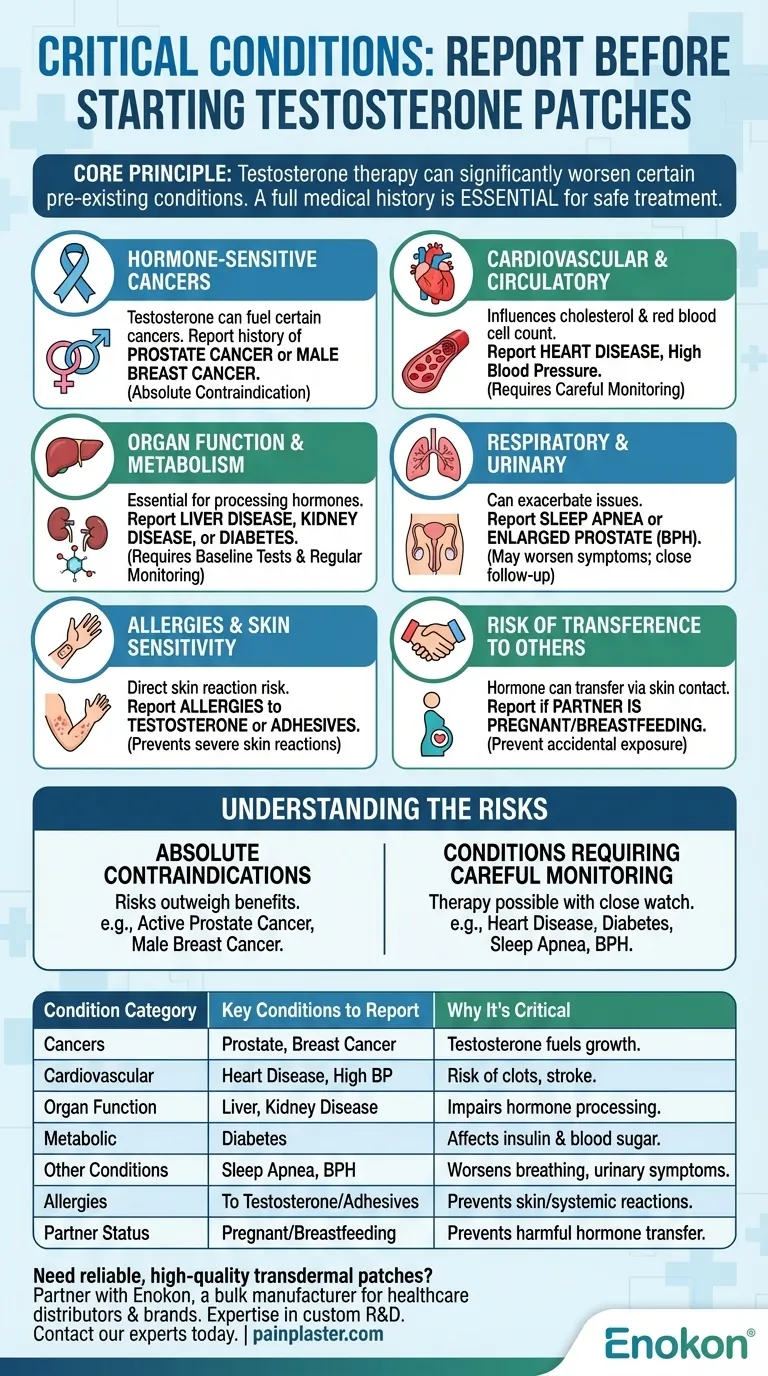Before starting testosterone patch therapy, you must inform your healthcare provider about any history of prostate or breast cancer, heart, kidney, or liver disease, diabetes, sleep apnea, or urinary problems from an enlarged prostate. It is also critical to disclose any known allergies to testosterone or adhesives and to mention if a female partner is pregnant, trying to become pregnant, or breastfeeding.
The core principle is that testosterone therapy can significantly worsen certain pre-existing medical conditions. A complete and honest medical history is not just a formality—it is the primary tool your provider uses to ensure the treatment is safe and beneficial for you.

Why Your Medical History is Critical for Testosterone Therapy
Providing a full medical background allows your doctor to weigh the benefits of testosterone replacement against its potential risks. Testosterone influences numerous body systems, and introducing it exogenously can have unintended consequences if underlying issues are not accounted for.
Hormone-Sensitive Cancers
Testosterone can act as a fuel for certain types of cancers.
This is why a history of prostate cancer or male breast cancer are among the most critical conditions to disclose. The therapy could potentially stimulate the growth of existing or dormant cancer cells.
Cardiovascular and Circulatory Health
Testosterone can impact several markers of cardiovascular health.
It can affect cholesterol levels and may increase red blood cell count, which could thicken the blood. For individuals with pre-existing heart disease, these changes require careful evaluation and monitoring to avoid increasing the risk of events like blood clots or stroke.
Organ Function and Metabolism
Your liver and kidneys are essential for processing hormones and medications.
If you have liver disease or kidney disease, your body may not be able to break down and clear the testosterone properly, leading to potential complications. Similarly, testosterone can influence insulin sensitivity, making it crucial to report a history of diabetes so blood sugar can be managed effectively.
Respiratory and Urinary Function
This therapy can sometimes exacerbate breathing and urinary issues.
Testosterone can worsen sleep apnea, a condition where breathing repeatedly stops and starts during sleep. It can also cause further enlargement of the prostate gland (BPH), which can intensify existing urinary problems like a weak stream or frequent urination.
Allergies and Skin Sensitivity
A direct reaction to the patch is a common and preventable issue.
You must report any known allergic reaction to testosterone itself or, just as importantly, to the adhesives used in patches. This helps prevent severe skin irritation, rashes, or a systemic allergic response.
Risk of Transference to Others
The hormone can be transferred to others through direct skin-to-skin contact.
This is particularly dangerous for women and children. It is essential to tell your doctor if your partner is pregnant, planning a pregnancy, or breastfeeding to discuss measures to prevent accidental exposure, which can cause serious harm.
Understanding the Key Risks and Contraindications
While some conditions simply require closer monitoring, others may rule out testosterone therapy entirely. Understanding this distinction is key to a safe treatment plan.
Absolute Contraindications
These are conditions where the risks almost always outweigh the benefits.
Active prostate cancer and male breast cancer are generally considered absolute contraindications. In these cases, testosterone therapy is typically not recommended under any circumstances.
Conditions Requiring Careful Monitoring
Many conditions don't forbid therapy but demand a cautious approach.
If you have heart disease, diabetes, sleep apnea, or an enlarged prostate, your provider may still proceed with treatment. However, they will need to monitor your condition much more closely with regular lab tests and check-ups to manage any negative changes.
The Danger of Accidental Exposure
The risk isn't just to you, but also to those you have close physical contact with.
If the application site on your skin touches another person, the testosterone can be absorbed into their body. This is why the patch should always be covered by clothing and why disclosing a partner's pregnancy is a critical safety step.
Making the Right Choice for Your Health
Your health history is the map your provider uses to navigate your treatment. Full disclosure is the only way to ensure you reach your destination safely.
- If you have a history of prostate or breast cancer: Understand that testosterone therapy is likely not a safe option for you.
- If you have heart, kidney, or liver disease: Expect your provider to conduct baseline tests and perform regular monitoring to ensure the therapy isn't straining these organ systems.
- If you have an enlarged prostate or sleep apnea: Be aware that the therapy could worsen your symptoms, requiring close follow-up and possible adjustments to your treatment plan.
- If your partner is or may become pregnant: Your primary focus must be on preventing any skin-to-skin transfer of the hormone from the patch application site.
Ultimately, a transparent conversation with your healthcare provider is the most important step in starting testosterone therapy safely and effectively.
Summary Table:
| Condition Category | Key Conditions to Report | Why It's Critical |
|---|---|---|
| Cancers | Prostate Cancer, Breast Cancer | Testosterone can fuel cancer cell growth. |
| Cardiovascular | Heart Disease, High Blood Pressure | Can increase risk of blood clots and stroke. |
| Organ Function | Liver Disease, Kidney Disease | Affects the body's ability to process the hormone. |
| Metabolic | Diabetes | Can influence insulin sensitivity and blood sugar. |
| Other Conditions | Sleep Apnea, Enlarged Prostate (BPH) | Therapy can worsen breathing and urinary symptoms. |
| Allergies | Allergy to Testosterone or Adhesives | Prevents severe skin reactions or systemic response. |
| Partner Status | Partner is Pregnant/Breastfeeding | Prevents accidental hormone transfer, which is harmful. |
Need a reliable, high-quality transdermal patch for your hormone therapy product line? Partner with Enokon, a bulk manufacturer of trusted transdermal patches and pain plasters for healthcare and pharmaceutical distributors and brands. Our technical expertise ensures superior custom R&D and development to meet your specific needs. Contact our experts today to discuss your project and benefit from our proven manufacturing excellence.
Visual Guide

Related Products
- Prostate Pain Kidney Health Care Patch for Men
- Capsaicin Chili Medicated Pain Relief Patches
- Far Infrared Deep Heat Relief Patches Medicated Pain Relief Patches
- Heating Pain Relief Patches for Menstrual Cramps
- Herbal Eye Protection Patch Eye Patch
People Also Ask
- What should be done if a testosterone patch falls off? A Guide to Maintaining Hormone Stability
- What should be done if a testosterone patch is missed or falls off? Follow these simple timing rules for safety and consistency.
- What lifestyle factors should be considered when choosing between testosterone patches and injections? Find Your Best Fit
- What should be done if a dose of testosterone patches is missed? Regain Stability and Safety
- What precautions should be taken when applying testosterone patches? Maximize Safety and Effectiveness














